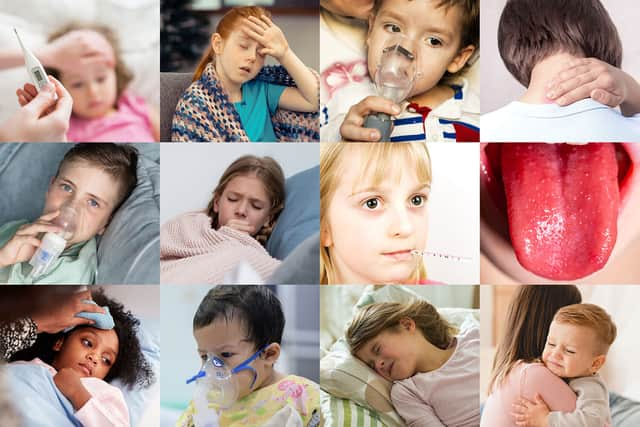Strep A symptoms: 4 warning signs that mean you should go to A&E immediately as parents told ‘be vigilant’
and live on Freeview channel 276
Parents are being urged to remain vigilant for signs of Strep A after at least nine children across the UK have died from complications caused by the infection.
The most recent death reported was five-year-old Stella-Lily McCorkindale in Belfast, who attended Black Mountain Primary School. The school sent a letter to parents on Friday (2 December) addressing the “tragic loss” of the “very bright and talented little girl” who was “very popular with both staff and children”.
Advertisement
Hide AdAdvertisement
Hide AdThe UK Health Security Agency (UKHSA) said there has been a rise in rare invasive Group A strep this year, particularly in children under the age of 10, with five deaths of under-10s in England since September.
There have been 2.3 cases of Strep A per 100,000 children aged between one and four this year in England, compared with an average of 0.5 before the pandemic. There have also been 1.1 cases per 100,000 children aged five to nine compared with the pre-pandemic average of 0.3.
Children at primary schools affected by the Strep A outbreak will now be given antibiotics as a prevention measure, health officials confirmed on Tuesday (6 December). The UKHSA said local health teams will be able to prescribe penicillin or an alternative antibiotic to all children in a year group that has been hit by a case of the infection, even if they do not have symptoms.
On Wednesday morning (7 December), Health Secretary Steve Barclay insisted there is no shortage of antibiotics after the National Pharmacy Association said there were “blips” in the supply chain of liquid penicillin, which is often given to children. He added that the level of supply was “not a concern at the moment” but stock could be moved around if there was an issue with particular GPs getting supplies.
Advertisement
Hide AdAdvertisement
Hide AdThe UKHSA has advised medics to have a low threshold for prescribing antibiotics for children who may be suffering infection linked to Strep A, and also said GPs should “maintain a low threshold for prompt referral” to hospitals of any children presenting with persistent or worsening symptoms.


What symptoms should parents look for?
Group A strep bacteria can cause many different infections, including the skin infection impetigo, scarlet fever and strep throat.
Common signs of infection can include a fever, sore throat, ‘strawberry tongue’ (when it becomes red and inflamed), a pinkish or red body rash with a sandpapery feel, chills and muscle aches.
It is recommended that parents contact NHS 111 or their GP if their child is getting worse, is feeding or eating much less than normal, has had a dry nappy for 12 hours or more or shows other signs of dehydration.
Advertisement
Hide AdAdvertisement
Hide AdThey should also seek help if their baby is under three months and has a temperature of 38C, or is older than three months with a temperature of 39C or higher. A very tired or irritable child is also a red flag.
When should parents go to A&E?
The vast majority of infections are relatively mild but in some cases the bacteria causes a life-threatening illness called invasive Group A Streptococcal disease (iGAS).
Invasive disease happens when the bacteria get past your body’s immune defences and invade other parts of the body, such as the blood, deep muscle or lungs. Two of the most severe, but rare, forms of invasive disease are necrotising fasciitis and streptococcal toxic shock syndrome.
Health officials are urging parents to be aware of the symptoms of Strep A so they know when to seek medical help. Four warning signs of iGAS to look for include:
- Fever (a high temperature above 38°C)
- Severe muscle aches
- Localised muscle tenderness
- Redness at the site of a wound
Advertisement
Hide AdAdvertisement
Hide AdYou should contact your GP or seek medical advice straight away if you think your child has any of the signs and symptoms of invasive disease.The UKHSA is urging parents to call 999 or go to A&E immediately if:
- your child is having difficulty breathing – you may notice grunting noises or their tummy sucking under their ribs
- there are pauses when your child breathes
- your child’s skin, tongue or lips are blue
- your child is floppy and will not wake up or stay awake
Dr Colin Brown, deputy director, UKHSA, said: “In very rare circumstances, this bacteria can get into the bloodstream and cause serious illness – called invasive Group A strep (iGAS). This is still uncommon; however, it is important that parents are on the lookout for symptoms and see a doctor as quickly as possible so that their child can be treated and we can stop the infection becoming serious.
“Make sure you talk to a health professional if your child is showing signs of deteriorating after a bout of scarlet fever, a sore throat, or a respiratory infection.”
Comment Guidelines
National World encourages reader discussion on our stories. User feedback, insights and back-and-forth exchanges add a rich layer of context to reporting. Please review our Community Guidelines before commenting.
